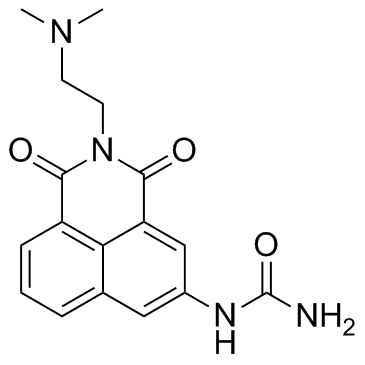956590-23-1
| Name | [2-[2-(dimethylamino)ethyl]-1,3-dioxobenzo[de]isoquinolin-5-yl]urea |
|---|---|
| Synonyms |
1-{2-[2-(Dimethylamino)ethyl]-1,3-dioxo-2,3-dihydro-1H-benzo[de]isoquinolin-5-yl}urea
Urea, N-[2-[2-(dimethylamino)ethyl]-2,3-dihydro-1,3-dioxo-1H-benz[de]isoquinolin-5-yl]- UNII-JY9JF7D78N Urea,N-(2-(2-(dimethylamino)ethyl)-2,3-dihydro-1,3-dioxo-1H-benz(de)isoquinolin-5-yl) UNBS-5162 UNBS5162 |
| Description | UNBS5162 is a pan-antagonist of CXCL chemokine expression, with anti-tumor activity. |
|---|---|
| Related Catalog | |
| Target |
CXCL |
| In Vitro | UNBS5162 is a pan-antagonist of CXCL chemokine expression and exhibits weak antiproliferative activity against human cancer cell lines with mean IC50 of 17.9 µM. UNBS5162 markedly impairs PC-3 tumor cell growth kinetics, without inducing senescence, whereas the reverse feature is observed with respect to DU-145 cells[1]. UNBS5162 is cytotoxic to a range of human cancer cell lines including glioblastoma (Hs683 and U373MG), colorectal (HCT-15 and LoVo), non-small-cell lung (A549) and breast (MCF-7), with IC50s of 0.5-5 µM. UNBS5162 also markedly increases the levels of expression of LC3-I and LC3-II in human cancer cells. UNBS5162 displays no anti-topoisomerase II activity. Moreover, UNBS5162 induces cancer cell death through lysosomal membrane permeabilization (LMP) in PC3 prostate cancer cells but not in U373 glioblastoma cells, with this LMP process occurring as an UNBS5162-induced decrease in Hsp70 expression[2]. UNBS5162 inhibits the proliferation of esophageal cancer squamous cells via the PI3K/AKT signaling pathway. UNBS5162 downregulates the protein expression of proteins associated with the PI3K/AKT signaling pathway, including the levels of phosphorylated (p)-AKT, p-mechanistic target of rapamycin kinase, ribosomal protein S6 kinase β1 and cyclin D1[3]. |
| In Vivo | UNBS5162 (20 mg/kg, i.v.) increases the therapeutic benefits of taxol in vivo in the orthotopic human PC-3 prostate cancer model[1]. |
| Animal Admin | Mice[1] Orthotopic xenografts are obtained by injecting 2.5 × 106 human PC-3 or DU-145 cells into the prostate of 6-week-old male nu/nu mice (n = 9 animals per treatment group). All grafts are performed under anesthesia [saline/Rompun/Imalgene; 5:1:1 by volume]. The end point in these orthotopic experiments is the survival period of the tumor-bearing mice after the administration of UNBS3157, UNBS5162, or reference anticancer agents (taxol, mitoxantrone, and amonafide). However, for ethical reasons, animals are killed when 20% of body weight have been lost compared to that determined at the time of tumor grafting. All animals are weighed three times a week. Autopsies and histologic diagnoses are performed on each mouse to confirm the presence of tumor development; 100% is achieved. In the case of UNBS5162 experiments in the PC-3 model, after the sacrifice of animals, tumors are removed from both drug-treated [10 mg/kg, intravenous (i.v.)] and vehicle-treated mice, fixed in buffered formalin, embedded in paraffin, and 5-µm-thick sections taken. These histologic slides are then stained with hematoxylin and eosin for blood vessel counts[1]. |
| References |
| Density | 1.4±0.1 g/cm3 |
|---|---|
| Boiling Point | 526.4±35.0 °C at 760 mmHg |
| Molecular Formula | C17H18N4O3 |
| Molecular Weight | 326.350 |
| Flash Point | 272.1±25.9 °C |
| Exact Mass | 326.137878 |
| PSA | 98.42000 |
| LogP | -0.05 |
| Vapour Pressure | 0.0±1.4 mmHg at 25°C |
| Index of Refraction | 1.702 |
| Storage condition | 2-8℃ |
